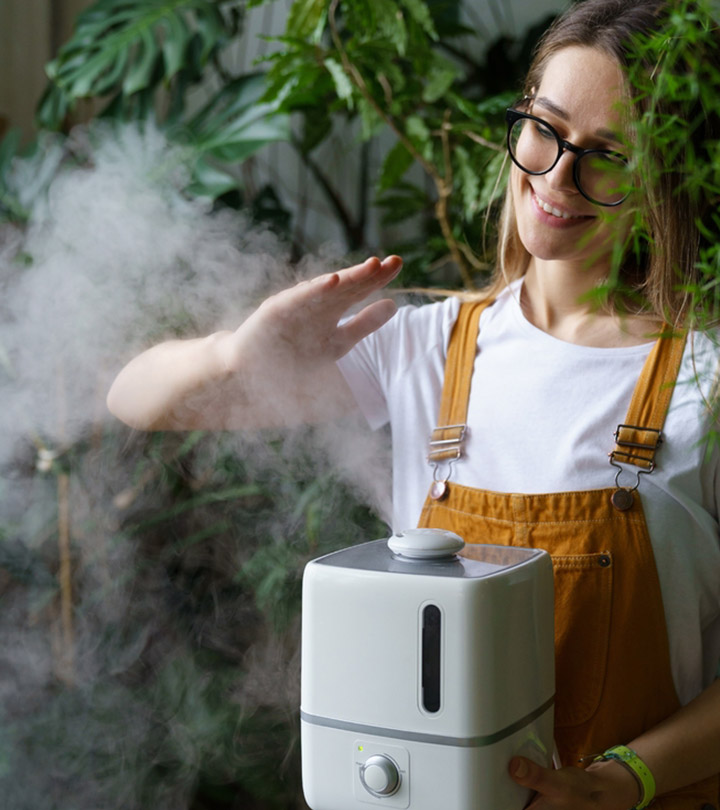A humidifier adds moisture to the air, and that is what you need in dry conditions. Lack of moisture in the air (low humidity) impacts your skin negatively. Using a humidifier helps you balance out humidity levels in your room and prevents the skin from becoming dry and rough. This may even help delay the appearance of aging signs like wrinkles, which may be contributed by dry skin.
In this article, we further discuss the benefits of using a humidifier for the skin, how it works, which humidifier to choose, and a few tips to use it safely. Keep reading.
Fun Fact The first indoor humidifier was invented by Robert Banks, an American inventor, in the 1960s.
In This Article
Benefits Of Using Humidifiers For Skin
1. Helps Reduce Water Loss From Skin
Shutterstock
Low humidity levels compromise the skin barrier function (1). Such weather conditions cause the lipids and oils that bind the skin cells together to evaporate and expose the inner layers of the skin to external hazards. This weakened skin barrier function causes more water to be lost from the skin’s surface, making the skin rough and dry (2). The increased dryness may further lead to dry skin disorders (3).
In addition, a study suggests that fine wrinkles may form on the skin if exposed to low humidity levels for short periods (like 6 hours) (4). A humidifier can balance out low levels of moisture in the air (5).
Related: 38 Home Remedies To Get Rid Of Dry Skin On The Face
2. May Help Manage Skin Disorders
Shutterstock
Dry air in air-conditioned rooms can worsen skin conditions like senile xerosis (dry skin) and atopic dermatitis (red, inflamed, and itchy skin) besides making the skin rough (6), (7). Humidifiers add moisture to dry air and may keep such skin conditions from progressing. A study shows that using a humidifier that generates nano-sized water particles may hydrate the skin better, improve the skin barrier function, and reduce transepidermal water loss (8). However, more studies are needed to assess this type of humidifier.
Related: 23 Effective Home Remedies For Skin Infection
3. May Prevent Bacterial And Viral Infections
Shutterstock
Certain bacteria or viruses thrive at both high and low humidity levels. These microorganisms can cause skin infections that threaten skin health and quality. Research shows that these microorganisms are less likely to survive at a relative humidity level of 30 to 60% (5). A humidifier helps balance out the humidity level, preventing the microbes from affecting the skin.
4. May Protect Skin From Irritants And Allergens
Shutterstock
As stated, low humidity levels affect the skin barrier function. As a result, irritants and allergens penetrate the skin (1). This may increase the risk of skin diseases and flare-ups in people with atopic dermatitis(red, inflamed, and itchy skin). A humidifier comes in handy by increasing the humidity levels.
What are the types of humidifiers available and how do they work? Let us discuss them in the next section.
Types Of Humidifiers And How They Work
Humidifiers are available in different types. These include:
- Console humidifiers: Ideal for floor use and are encased in cabinets.
- Portable humidifiers: Smaller and transportable.
- Central humidifiers: Built into heating and air conditioning systems. They humidify the entire premises.
- Ultrasonic humidifiers: Create cool mists through ultrasonic sound vibrations.
- Impeller humidifiers: Have a high-speed rotating disk that produces cool mist.
- Evaporative humidifiers: Send moisture into the air using a fan to blow out air through a wet absorbent material like a belt or filter.
- Steam vaporizer humidifiers: Use an electrical heating mechanism to heat water. The warm mist formed is then cooled before exiting the humidifier.
StyleCraze Says To choose the best indoor humidifier, consider the size of the room you want it for. You need a balanced humidity level for best results, which should be between 30-50%, according to experts.
You can choose a humidifier depending on your needs. If you don’t know how to use it for improving your skin, here are some tips.
Related: 14 Best Home Remedies For Skin Allergies | Causes And Symptoms
How To Use A Humidifier To Improve Skin— Tips To Consider
Shutterstock
- Add water to the humidifier. Use bottled or distilled water as it contains fewer microorganisms and lower mineral content.
- Clean the humidifier regularly. It may contain microorganisms or dirt particles that may affect your skin and health. Clean portable humidifiers every third day. Empty the tank and use a brush or scrubber to clean them. Remove any scales, deposits, or film formed on the sides of the tank or on interior surfaces. Wipe all surfaces dry. Be sure to unplug the unit while cleaning.
- Do not use the humidifier in all climatic conditions. Use it only to balance out humidity and moisture conditions.
- Use demineralized cartridges and filters.
- The skin becomes dry and rough at low humidity. Switch on your humidifier before you get into the daily skin care routine. This helps your skin retain moisture for longer periods.
Using a humidifier during the day might improve your skin health. But is it alright to keep it running the entire night as you sleep? Read to know more.
Is Sleeping With A Humidifier Turned On Good For Skin?
Using a humidifier as you sleep is perfectly alright. It might even help you sleep better if you have dry and itchy skin, sinus issues, cold congestions, and cracked lips. Besides, applying your skincare products and sleeping with the humidifier running may promote uninterrupted sleep. It improves skin moisture and may even keep your scalp free of itching or dryness.
It is clear that a humidifier can improve skin health. But it may have some side effects too.
Things To Be Aware Of — Risk Factors
Research shows that the toxicity of biocides (pesticides or fungicides) mixed in the water of humidifiers may cause a particular pulmonary syndrome in pregnant women and children (9). Using a humidifier may also increase the humidity levels, which may support the growth of microorganisms that can cause infections (5). Using humidifiers may also cause thermal discomfort (exposure to either excess heat or excess cold) (6). Water mist sprays can be an effective alternative. They hydrate the skin without the drawbacks of a humidifier.
Subscribe
Stop using a humidifier if you experience any respiratory issues. Contact your doctor immediately.
Infographic: How To Keep Your Humidifier Clean
One of the numerous ways to keep your skin hydrated and healthy is to use a humidifier. However, keep in mind that humidifiers should be free of hazardous bacteria and germs. So, make sure to follow the manufacturer’s instructions. Check out the infographic below to understand more about keeping your humidifier clean.
Using a humidifier for the skin is one of the many ways to keep your skin moisturized and healthy. It will help maintain the skin barrier function and protect your skin from excess water loss and the sun’s harmful rays. If you have sensitive or dry skin, using a humidifier will help reduce the risk of skin irritations and allergies. To improve your skin health, be consistent with your skin care regime and use the humidifier when you sleep. This helps prevent many issues like skin dullness, itching, flare-ups, and dryness. However, you should also be aware of its side effects. Therefore, take precautions and go through the product details carefully while buying one for your home. Consult a doctor if you experience any respiratory issues.




